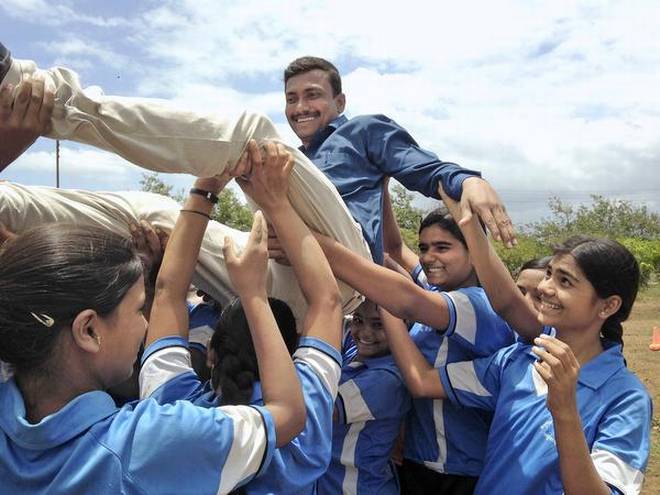By Rahul Desai
Field Of Dreams, a short 25-minute documentary by Minnie Vaid, is as indicative of the ‘grammar’ of biopic filmmaking in India as it is of an inspiring trend in Maharashtra’s impoverished Jalna district. The film tells us about a bunch of school-going girls from this region that have embraced football to escape a predetermined, shackled cycle of child-marriage, poverty and misogyny. As one of them maturely puts it, “the sport teaches me much about life – cooperating, interacting, expressing and understanding others.”
We see the NGO-run, government-funded school that ‘recruits’ them, their noble principal and coach, scattered montages of cheery practice and games, and a little about their struggles to defy the male gaze. Much of their situation – and the overall flow – is conveyed through lengthy text written at the bottom of the screen, identical to quick-fire narrative voiceovers sounding out the film’s more mainstream cousins. When they speak on camera, they sound clear and acutely self-aware of where they stand in context of their path-breaking attitude. Almost as if they were being told what to say (“my thinking isn’t restricted to village levels now”); yet, the raw, wide-eyed way they say it sets them apart from the many on-screen ‘heroines’ we’ve grown accustomed to off late. That they were comfortable enough to assert their rather quotable thoughts lends credence to the possibility that perhaps their “commercial” versions aren’t so farfetched after all.
We see other familiar templates, despite this being not a ‘film based on a true story’ but the true story itself: the spunky male coach describes how the girls uncomfortably pulled their jerseys over their knees after ditching their salwars for shorts; a girl talks about her stubborn hunger-strike when forced to meet a potential husband (“I’ll marry only if I don’t do well in my boards”); the coach stages a night-time pep talk (“dream while you’re awake”); a mandatory class-divide shot depicts a Pune team drinking Gatorade while their more modest Jalna counterparts hold Bisleri bottles; the ‘protagonist’ expresses searing pride the National Anthem incites in her at the Homeless World Cup in Chile; she sweetly describes her confusion at the ‘seatbelt’ instructions during her first airplane ride; and a low-angle camera circles around her, framing her like a phoenix as the final strands of a relentless elevator-ish background score reaches its loud crescendo.
At one point, we see the roomful of them engrossed by Chak De! India on the TV set (compulsory viewing, obviously), followed by a fleeting shot of them coyly painting their nails on bunk beds. Here, you wonder how much of their mannerisms, ‘dialogue-baazi’ and team chants they derive from their favourite movies (which are, incidentally, based on subjects not unlike themselves) – or is it vice versa? These little vignettes clearly demonstrate the makers’ awareness of the storytelling ‘structure,’ an accessible and safe language, their film attempts to recreate. In this era of Dangal, we’re so used to observing and lauding high-profile films that celebrate the rise of womanhood that when real people are shown reinforcing their melodramatic stereotypes, a viewer is prone to missing the essence – the aura of actual documenting – of this original material. Thanks to the deliberate blurring of the line between packaged fact and factual fiction, they all fall under the same generic umbrella for new-age viewers. As a result, we tend to view unglamorous documentaries as merely important projects, albeit with lower production design and not enough ‘plot’.
Either way, there is a universal romance to the tale of a slum-dweller consciously push back against a system, against insurmountable odds, as if she were already starring in a genre-making blockbuster about her own life, as if she were already a soul destined to become a symbol. There is an innocent fire that can’t be scripted, when she claims to have discovered football to be far more than a career, and when she promises to give her all to represent her country. It is her escape, yes, and like many others, perhaps she too embraces the influence of a man to show her the light. But as long as the light is bright, and Rohini Pashte’s escape paves the way for even two other minds, hers becomes a story worth naming. Worth following, even. Much like fiery Akshaya Surve’s in Beyond All Boundaries, the teenager who derives strength from her crumbling domestic circumstances to play cricket for the Mumbai Under-19 Women’s team. Or like Sampat Pal Devi’s, the fallen leader of the Bundelkhand-based vigilante group from Nishtha Jain’s Gulabi Gang.
In such cases, in these times, simple awareness is an appropriate victory. It may not amount to much in the bigger picture of a tunnel-visioned city slicker’s life. But it informs us, even if the filmmakers choose to be a little lazy and ‘basic’ about it. It becomes more essential that they choose these stories, before presenting them on whatever scale they’re allowed to. Maybe this isn’t an ideal scale, but then this medium very rarely is. Eventually, the existence of tiny nuggets like these contribute to the conscious celebration of gender-equality and liberalism exploding in our circles when Bollywood taps into the theme, and when films like Dangal, MS Dhoni, Budhia Singh or an upcoming Saina Nehwal biopic inspire heated social media debates and op-ed articles. You don’t need a silly tagline like ‘Goal’den Girls to flank the rough, widely trodden fields of lofty dreams. Just as they’re no winners and losers when the whistle is blown. But tell that to Rohini, or Akshaya, or Saina, Sania, Sakshi, Sindhu, Geeta, Babita and Dipa. Their films begin – and end – in that field. Away from our cheers, tears, analysis and reportage.







Leave A Comment
You must be logged in to post a comment.